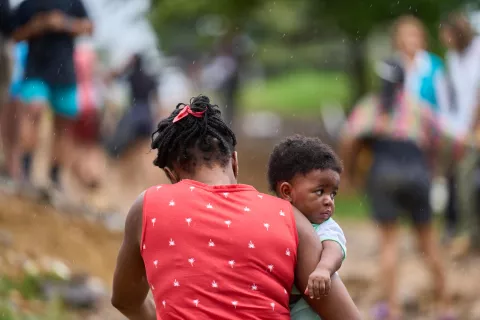A father from the start
With the help of family-friendly policies, couples in Cuba break gender norms by sharing parenting responsibilities.

- Available in:
- English
- Español
HAVANA, Cuba – When Juan Carlos and María decided to start a family three years ago, they knew that there was only one way they would raise their children. “In order for a family to work it needs to be a team, and that means sharing all the tasks and responsibilities,” says Juan Carlos.
As a first-time father, Juan Carlos didn’t yet know the ins and outs of parenting, but he knew he needed to be present. “There are things we can’t share, like the discomfort or the physical weight of a pregnancy, but I can be there for [María], learning together and sharing the journey,” he says.
Juan Carlos made sure he could attend all the pre-natal check-ups with María. During the appointments, the couple noticed that most of the instructions and advice were directed only at her. Juan Carlos had to repeatedly emphasize his interest before he was taken seriously. He wanted to know his role, and how he could help his child develop to his full potential, but he didn’t know where to turn.

Cuba’s family-friendly policies
Cuba is one of 15 countries that has three social policies and basic programmes to support parents: free public pre-primary education for the first two years; at least six months of paid maternity leave to support breastfeeding; and 12 months of paid paternity leave after the birth of a baby.
“In order for a family to work it needs to be a team, and that means sharing all the tasks and responsibilities."
But despite these family-friendly policies and programmes, social norms and structural barriers in Cuba hinder men’s equal participation in all stages of parenting. Only 18 per cent of fathers participate in educational activities with their children during early childhood, only 33.2 per cent of children under six months of age benefit from exclusive breastfeeding, and only 125 fathers took paternity leave between 2003 and 2014.
As a result, many children aren’t getting the full benefits of having a crucial father figure in their development.

Taking advantage of vital resources
When María recently became pregnant with their second child, Oliver, the two parents did everything they could to take advantage of the resources available to them. “No preparation is ever too much,” says María. “Being parents means learning that whatever you do or don’t do has a long-lasting impact on your children’s development and happiness. It is a deep life reflection which encourages you to want to do things right, from the beginning.”
This time around, the couple learned that they had access to free child birth classes. “These were really useful, and we met other couples in our same situation,” she says.
They also learned that María had the right to have a companion of her choice during labour, and Juan Carlos jumped on the opportunity. “For me it was a vital, unrepeatable experience that I think every father should have. You just can’t believe the pain and sacrifice women go through,” he says. “That arrival commits you for life.”
Juan Carlos first read about these rights and services in Father from the Beginning communication materials, an initiative led by Cuba’s Ministry of Education and the Ministry of Health, with UNICEF support. It aims to engage fathers in parenting by informing them about their rights, responsibilities and the benefits of equally shared parenting.
María has exclusively breastfed her two sons during their first six months of life. “I couldn’t have done it without Juan Carlos. I might be the only one that can actually feed the babies, but Juan Carlos has been the one to wake up in the night and bring them to me and take care of the household chores.”

Challenging gender roles for future generations
Juan Carlos has also been the one to stay home with the children after María’s maternity leave, so that she could resume work. “It’s been a marvelous experience,” he says. “Having a role in [their lives] from the beginning gives you the confidence to take over completely, and enjoy it!”
María agrees: “It’s not only about him carrying out the traditional roles: doing the washing and cleaning, preparing the food or taking care of the baby, but about spending quality time together, developing a father-son bond which will be the base of their relationship in the future.”
The Father from the Beginning initiative encourages equal parental responsibility from birth, precisely because early engagement from fathers increases the chances of life-long participation. Fathers who are actively involved in parenting early on not only show more commitment to protecting their children from violence and prioritizing their education and health, but also question deeply rooted beliefs and stereotypes about masculinity.
“Our neighbours initially thought our way of parenting was strange, but they don’t see it like that anymore,” says Juan Carlos. “I see change, the younger generations are evolving.”



